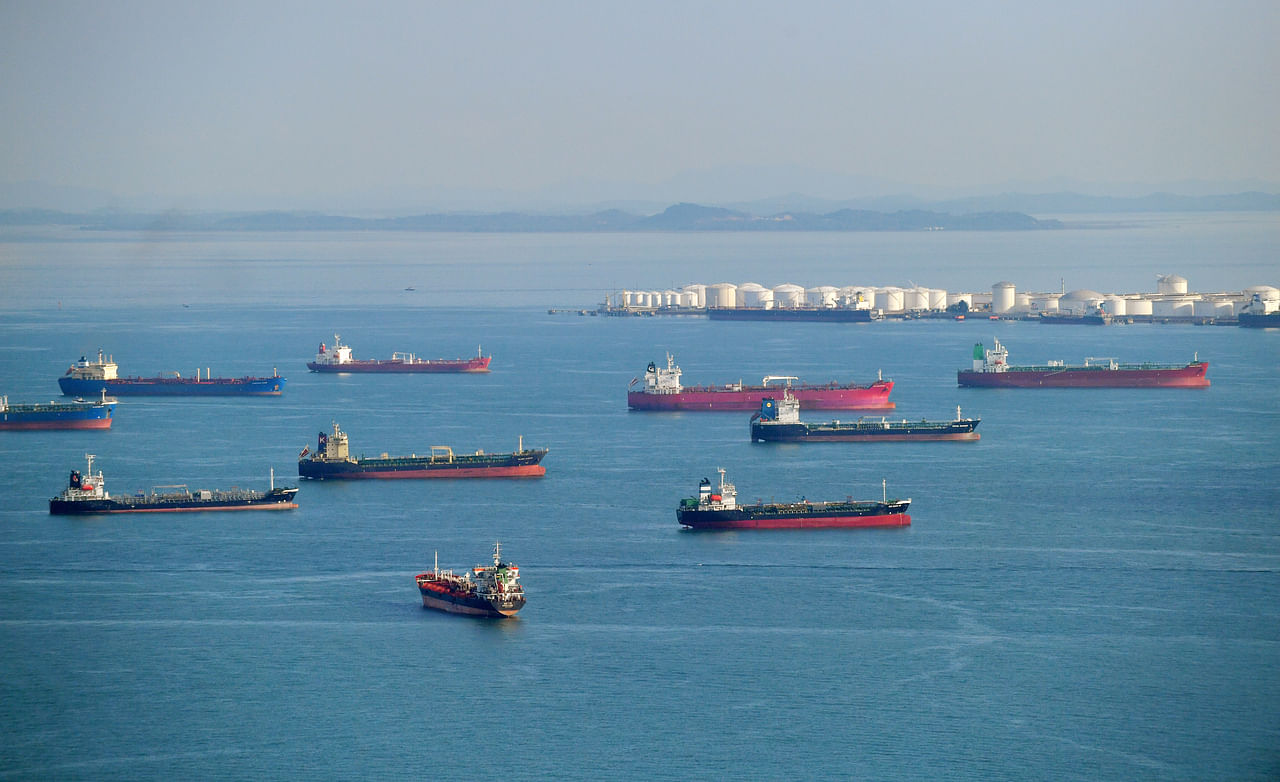More ships call at Singapore port in August to refuel due to steep drop in oil prices
Sign up now: Get ST's newsletters delivered to your inbox

MPA data showed that 3,212 ships called here in August specifically to refuel.
PHOTO: ST FILE
Follow topic:
SINGAPORE - Marine fuel sales in Singapore, the world's largest bunkering hub, remained healthy in August due to lower oil prices that attracted more ships to refuel here.
Sales rose in August to 4.12 million tonnes, rising around 1.1 per cent compared with August last year, while matching July sales this year, industry sources and data from the Maritime and Port Authority of Singapore (MPA) showed.
August sales were higher than the year-to-date monthly average of around 3.9 million tonnes, according to calculations by The Straits Times.
MPA data also showed that 3,212 ships called here in August specifically to refuel, the highest since November, when a similar number of ships called at the port to bunker.
In July, 3,181 vessels stopped over in Singapore to load bunkers.
"We did more refuelling in Singapore last month, largely due to the lower prices, which have been impacted by the deep drop in crude oil prices," said one senior marine fuels procurement manager.
"If the price is right, we will continue to refuel here in Singapore, where operationally, there is less downtime as opposed to loading elsewhere in the region."
At the start of August, prices for low-sulphur shipping fuel were trading at around US$875 a tonne. They then dipped to as low as US$740 a tonne in the middle of the month and ended August at around US$742 a tonne.
In June, shipowners paid around US$1,000 a tonne for the cleaner and more environmentally friendly low-sulphur fuel.
In July, the fuel transacted between US$800 and US$900 a tonne, traders said.
Meanwhile, the sales of higher-sulphur marine fuel were marginally lower in August, at 1.2 million tonnes compared with 1.3 million tonnes in July.
This was largely due to the reduced number of physical suppliers selling this grade following the temporary exit of Glencore's bunkering services in Singapore, said Mr Ivan Mathews, head of refining and global fuel oil service at consultancy FGE.
The global trading giant had its bunker licence suspended for two months from Aug 18 after being found to have wilfully supplied tainted marine fuel to 24 ships between March 22 and April 1.
Mr Mathews did, however, note that while sales of higher-sulphur marine fuel dipped slightly, sales of the most commonly used low-sulphur grade actually picked up, with 2.06 million tonnes sold compared with July's 2.01 million tonnes. He added that this increase was likely due to lower prices.
He added: "Low-sulphur deliveries could see upside as prices in September, so far, have trended lower. In addition, potentially more supplies in China from the latest release of the lower-sulphur export quotas could further lower prices in the region."
Traders said prices were now pegged at around US$690 a tonne.
Mr Roslan Khasawneh, a senior analyst at data analytics firm Vortexa, said the fourth-quarter fuel oil markets in Singapore look relatively healthy on the supply side.
"More of Russia's massive high-sulphur barrels continue to flow east to Asia and the Middle East, away from traditional markets in the United States and Europe," he said.
"Imports from Russia to markets east of the Suez, mainly Asia and the Middle East, are also likely to be higher as European buyers increasingly turn their back on Russian oil imports ahead of the EU embargo on oil product imports from February 2023."
An embargo initiated by the European Union on crude oil is due to kick in on Dec 5.
Mr Khasawneh did warn, however, that demand for the high-sulphur fuel oil, a key component in marine fuels, could expand going into the winter, with many countries in Asia switching to burning fuel oil instead of gas because of availability and cheaper prices.
ST understands that power companies, particularly from developing countries such as Pakistan, Bangladesh and Sri Lanka, are increasingly looking at procuring larger quantities of fuel oil for power generation this winter, with increased monthly volumes set to kick in from the fourth quarter.
"Demand for high-sulphur fuel oil may stay stronger than usual in the winter season as more scrubber-fitted ships (ships with gas cleaners) enter the market and as high gas prices encourage utilities to switch to burning fuel oil where possible," he said.
"Russia needs to find new outlets for its fuel oil, and Asia and the Middle East have so far been the most active off-takers (buyers)."

